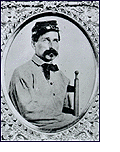|
|
|
| ||
|
PART 1: Frances' Father and Uncle Enlist for the Union; Command "Colored Troops"
FRANCES' FATHER AND UNCLE ENLIST FOR THE UNION
Densmore served as a quartermaster's clerk in Tennessee. He was taken prisoner-of-war on July 13, 1862 when his regimental commander surrendered the 3rd Minnesota to legendary Confederate fighter Nathan Bedford Forrest. Two days later Densmore and the other enlisted men were paroled. To some men of the 3rd it was a humiliating affair, but Densmore's surviving letters barely mention it. Later that summer, Ben Densmore found himself back in Minnesota fighting Dakota Sioux Indians. The 3rd Minnesota marched across the state looking for a fight. But they also had to eat. On September 23, some of the men were off digging potatoes at a place called Wood Lake when they were ambushed by a Dakota war party. In the ensuing battle, Densmore was struck in either the back of the head or neck by a musket ball - reportedly Indian fire - and knocked unconscious. Densmore was carried back to camp "thus saved from massacre and mutilation." One report describes him scrounging a gun and returning to the battlefield "weak from loss of blood" but ready to fight. At least five soldiers died, and 29 were wounded in the fight. 2 Also in the summer of 1862, Benjamin Densmore's younger brother Daniel, a 27-year-old law student, joined with friends to form their own company of Union volunteers. The brothers began a richly detailed correspondence about their separate-but-parallel military careers. Both men sought - and received - an officer's commission in the newly formed Bureau of Colored Troops. Under a recent order from President Lincoln, freed slaves were viewed as war contraband. In Columbus, Kentucky, Benjamin Densmore helped organize former black slaves into a new company of Union soldiers. Benjamin Densmore wrote to his brother: "The work necessary to fit such troops as these for any kind of military duty is far heavier than with the American troops." 3 Nevertheless, both men stayed with their regiments through the end of the war. COMMAND "COLORED TROOPS" Benjamin Densmore rose to the rank of captain in the U.S. 4th Colored Heavy Artillery. Daniel surpassed him, rising to lieutenant colonel of the U.S. 68th Colored Infantry. Some 200,000 ex-slaves, freedmen and officers served under the Bureau of Colored Troops. Only white men could hold command positions. They had to prove a commitment to uplifting the black race in addition to a zeal for fighting the enemy. Both Daniel and Benjamin studied the arts of war to qualify. Some 27 officers endorsed Benjamin Densmore's application to the corps. 4 Ambition was at least part of the brothers' motive for volunteering to fight with black soldiers. They may have been able to rise higher and faster in the colored troops than through conventional ranks. It wasn't the kind of command that most aspiring white officers would seek - racial prejudice was too strong . Congratulating Benjamin on his promotion to lieutenant, Daniel wrote: "To a person setting out single-handed and without capital, the military service offers the most inviting chances of money at the present time." Benjamin predicted that his post-war career would benefit from having served - that those who fought for liberty would shine more luminously than men who stayed at home. Neither Densmore made the military a career. 5 Rarely in the letters from Benjamin and Daniel can one find the powerful abolitionist principles which drove some other men to seek a command among "sable skins." Like many Northern loyalists, the Densmores appear more outraged by the Confederate assault on the Union than the immoral Southern slave system. In a letter to his son Benjamin, Orrin Densmore Sr. wrote: ...You enlisted to maintain a just and holy cause. We know our cause is as just as it was in the time of the revolution, when our forefathers were struggling to throw off the yoke of oppression. O, may we ever be as true and valiant as they to stand by our country's flag until we can see it wave over every foot of our United States.6In all of the surviving correspondence, Orrin Sr., is the most explicitly abolitionist, though freedom for the slaves hardly dominated his thinking. 7 Daniel Densmore complained bitterly about the treasonous rebels and the Union's sluggish response. In a scathing letter to Benjamin about the possibility of their army service dragging on indefinitely, Daniel accused President Lincoln of being too soft on the South. The [Southern] rascals that have had the villainy flogged out of them will need the most careful watching for some time, unless our chicken hearted president should so far restrain his love for southern traitors. 8While the Densmores may not have been motivated by anti-slavery passion, the brothers were clearly more progressive on racial questions than many Northerners. White prejudice both in and outside the army held that blacks were either too lazy to make good fighters, or would revert to their primitive natures and rape and kill with wild abandon.9 Benjamin and Daniel generally admired both the fighting capacities in the men and their discipline. Benjamin wrote to his brother predicting that blacks would make excellent fighting machines. As he steamed down-river to Memphis and then into the field, Daniel Densmore observed: I have not seen a more able-bodied regiment either white or black. The men are uniformly large and muscular. They behave themselves very nicely too, and take hold of soldiering with a will. But I shall be very anxious to have them get a smell of blank cartridges before we see any secesh.10
PART 2: The Treatment of Black Troops; The War Ends
| ||||

